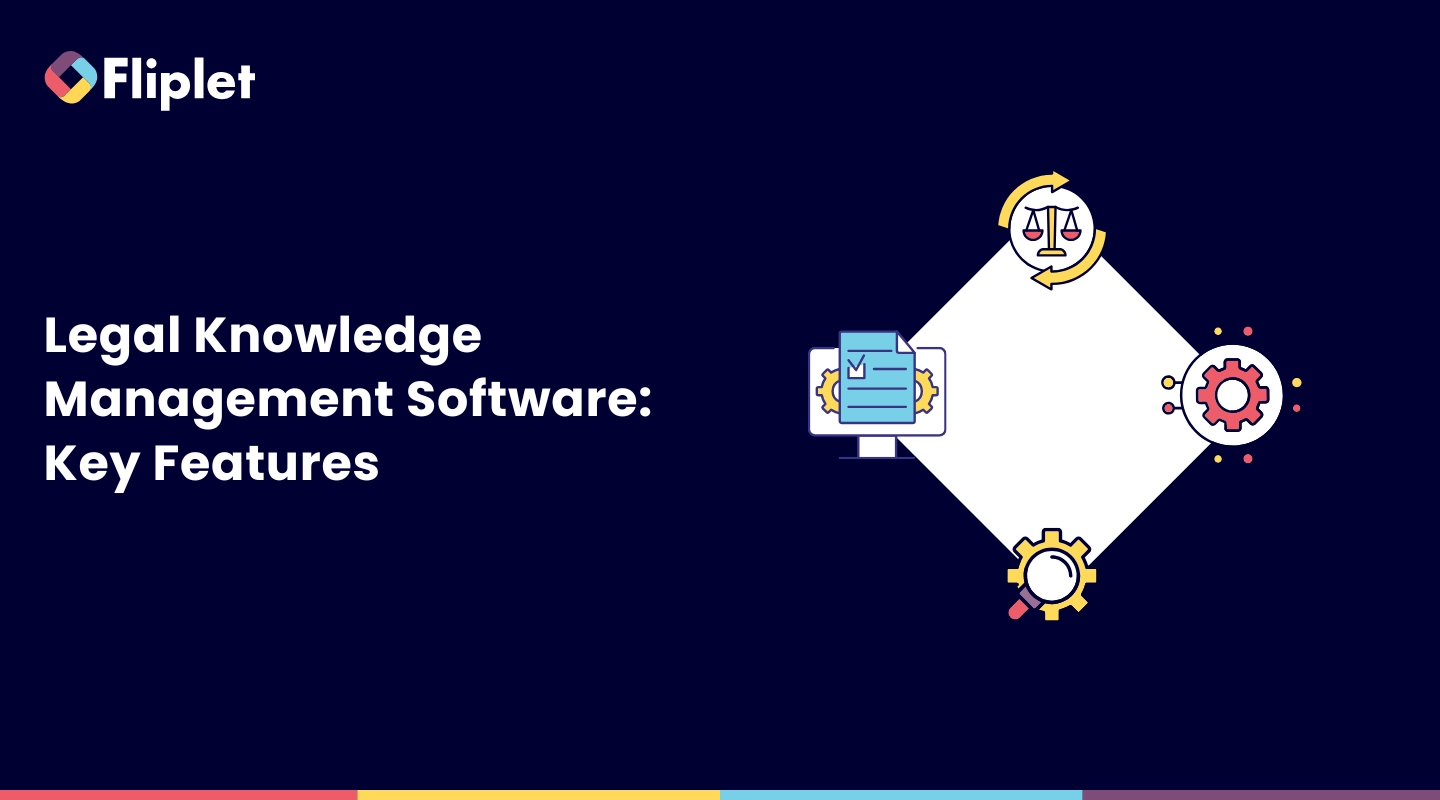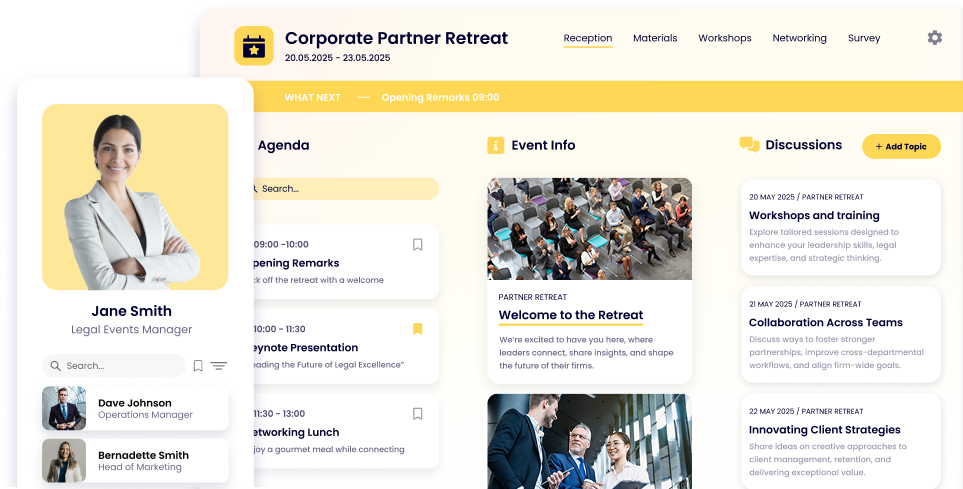Mastering Legal Knowledge Management: A Guide for Law Firms

Lisa Broom | Head of Marketing

Without a system in place, essential case law, research, and client information can get lost in the shuffle. So, how can law firms stay on top of this influx of data and use it to their advantage? That’s where legal knowledge management software comes into play. Imagine having the ability to streamline workflows, foster collaboration, and improve decision-making—all through a single, easy-to-use platform.
In this guide, we’ll explore how law firms are mastering legal knowledge management, the benefits of doing so, and what you can do to set your firm on the right path. We’ll also see why law firms love using Fliplet.
Ready to unlock your firm’s potential? Let’s dive in.
Key Takeaways
- Legal knowledge management organizes and stores crucial data, improving collaboration and efficiency.
- Implementing KM can streamline workflows, allowing for better decision-making and faster access to vital information.
- Customizable legal knowledge management software like Fliplet offers powerful solutions for firms of all sizes.
What is Legal Knowledge Management?
Before we get into the nitty-gritty, let’s start with a brief overview of legal knowledge management.
So, what is itt? Simply put, it’s the process of collecting, organizing, and making accessible the vast amount of legal knowledge within a firm. This includes everything from case law, legal research, and precedents, to client information, contracts, and important documents.
Knowledge management systems, often referred to as KM systems, serve as the backbone for many law firms, enabling them to efficiently access and share vital information. This makes finding the best legal acknowledgement management software a core task for pushing your law firm into the future.
Whether you’re handling a high-profile case or providing day-to-day counsel, having a solid KM system in place makes it easier to find the data you need, collaborate with your team, and make informed decisions quickly.
But KM isn’t just about storing information—it’s about managing and using it effectively. Law firms that embrace legal knowledge management tools can streamline their entire workflow, which ultimately leads to better service for clients.
Check out more legal website content here.
The Benefits of Legal Knowledge Management

You might be wondering: Why is legal knowledge management so important? The truth is, it’s a game changer for law firms looking to stay competitive in today’s fast-paced legal environment. Let’s break down some of the top benefits:
1.Better Collaboration
Key Statistic: 70% of lawyers now use web-based software. (Source)
How often do your lawyers and staff need to collaborate on cases? With KM software, sharing information and working together becomes seamless. When all your firm’s legal knowledge is stored in one place, anyone from your team can access it, regardless of their location. Imagine being able to work on a case with colleagues in different offices or even time zones, all with real-time updates and shared access to essential documents. Collaboration has never been this easy.
2.Faster Decision-Making
In the legal world, every second counts. Having quick access to crucial information can mean the difference between winning and losing a case. With legal knowledge management systems, retrieving important documents or case law is as simple as typing in a search query. Advanced search capabilities allow lawyers to instantly pull up the information they need, making the decision-making process faster and more informed.
3.Streamlined Workflows
Key Statistic: Lawyers spend 21% of their time looking up information. (Source)
Time is money, and KM software helps law firms save both by automating tasks that used to take hours. Whether it’s organizing case files, scheduling tasks, or managing client communications, knowledge management software streamlines the entire process. This means your team can spend less time on admin tasks and more time focusing on what really matters—your clients.
4.Improved Client Service
Clients expect top-notch service, and with legal knowledge management tools, your firm can deliver. With the ability to access client files and case information at the click of a button, you can provide faster responses, more accurate legal advice, and better overall service. Plus, with all your client data in one place, it’s easier to keep track of each client’s unique needs and preferences, allowing for a more personalized approach.
5.Enhanced Data Security
Key Statistic: 40% of law firms had a security breach last year. (Source)
Let’s not forget about security. Law firms deal with sensitive client information every day, so keeping that data secure is crucial. Legal knowledge management software comes with built-in security features, such as data encryption and access controls, ensuring that only authorized personnel can access sensitive information.
5 Tips to Perfect Your Legal Knowledge Management Function
Ready to take your legal knowledge management to the next level? Here are five actionable tips to help your firm succeed:
1.Develop a Clear KM Strategy
A successful KM system starts with a well-thought-out strategy. Begin by identifying your firm’s specific needs and goals. What information do you need to manage? How will you organize it? Who will be responsible for maintaining the system? By answering these questions upfront, you’ll set your firm up for success.
- Example: Imagine a law firm that specializes in corporate litigation. They start by identifying key knowledge areas like legal precedents and client communication. The firm assigns a KM team to ensure the system is regularly updated, focusing on case law research and document management.
2.Foster a Knowledge-Sharing Culture
Knowledge management isn’t just about technology—it’s about people. Encourage your team to actively share their knowledge and expertise. Create a culture where collaboration and information sharing are valued, and you’ll see the benefits ripple across your entire firm.
- Example: A mid-size firm introduces weekly ‘lunch and learn’ sessions where attorneys share insights from recent cases. This simple practice encourages knowledge sharing across departments and helps junior staff learn from experienced colleagues.
3.Leverage Appropriate Technology
There are plenty of legal knowledge management tools out there, but not all of them will be right for your firm. Take the time to evaluate your options and choose software that aligns with your firm’s needs. Platforms like Fliplet offer customizable solutions that can be tailored to fit firms of all sizes, making it easier to manage legal knowledge.
- Example: After evaluating several platforms, a small firm chooses Fliplet’s KM solution because it integrates seamlessly with their existing case management software and is customizable, allowing the team to create a tailored experience for managing legal documents.
4.Implement Robust Processes
Without proper processes in place, even the best KM software won’t be effective. Create a system for how information will be collected, stored, and shared. This might include setting up guidelines for document naming conventions, access controls, and how often information should be updated.
- Example: A firm sets up a standardized document naming convention, making it easier to find case files quickly. They also create an access control policy, ensuring that sensitive documents are only available to relevant team members.
5.Commit to Continuous Evaluation and Improvement
Legal knowledge management is not a set-it-and-forget-it solution. Regularly evaluate your KM system to identify any gaps or areas for improvement. By continuously refining your processes and tools, you’ll keep your firm at the forefront of legal knowledge management.
- Example: Every quarter, a law firm conducts an internal review of their KM system. They gather feedback from attorneys on usability and make adjustments, such as adding new search filters to improve document retrieval efficiency.
Key Components in Information Management for Law Firms

When it comes to legal knowledge management, there are several key components to keep in mind:
Document and Records Management
Keeping track of case files, contracts, and client documents can quickly become overwhelming. A good legal knowledge management system will allow you to organize and securely store all your documents in one place. With everything organized and easily accessible, you’ll save valuable time that would otherwise be spent searching through files.
Knowledge Capture and Sharing
Your team’s knowledge is one of your firm’s most valuable assets. But if that knowledge isn’t captured and shared, it’s wasted. KM tools allow you to document and share your team’s expertise, ensuring that everyone has access to the information they need to succeed.
Technology Integration and Tools
The best KM systems don’t operate in isolation—they integrate seamlessly with your other legal tools, such as billing software, case management systems, and communication platforms. This level of integration ensures that all aspects of your firm’s operations are connected, creating a more efficient workflow.
Data Security and Compliance
When dealing with legal knowledge, security is paramount. A solid KM system will come equipped with security features like encryption, access controls, and compliance with legal regulations, ensuring that your client data is safe and secure.
Continuous Process Improvement
As your firm grows and evolves, so should your knowledge management system. Regularly review and update your KM processes to ensure that they continue to meet your firm’s needs. This might involve implementing new technology, updating your security protocols, or refining how information is organized and shared.
Challenges in Implementing Legal Knowledge Management
As beneficial as legal knowledge management can be, implementing it isn’t without its challenges. Here are some common obstacles law firms face and how to overcome them:
Cultural Resistance
Change can be hard, and some team members may be resistant to adopting a new KM system. The key to overcoming this challenge is communication. Clearly explain the benefits of the new system and provide ample training to ensure everyone feels comfortable using it.
Solutions:
- Conduct informational sessions explaining KM benefits.
- Offer regular training to build comfort with the system.
- Highlight how KM tools can save time and improve client outcomes.
High Upfront Costs
Implementing KM software can require a significant initial investment, but the long-term benefits far outweigh the costs. Look for scalable solutions like Fliplet that can grow with your firm and provide long-term value.
Solutions:
- Start with scalable KM software like Fliplet.
- Spread costs over time by implementing tools gradually.
- Emphasize long-term savings in efficiency and productivity.
Integration Issues
If your firm uses multiple software platforms, integrating them with your KM system can be tricky. Choose a knowledge management tool that offers strong integration capabilities to ensure a smooth transition.
Solutions:
- Select KM tools with robust integration capabilities.
- Test integrations with existing systems before full implementation.
- Work with vendors to customize solutions that fit your firm’s workflow.
Legal Knowledge Management Software: Key Features

When selecting legal knowledge management software like Fliplet, it’s crucial to focus on key features that can significantly impact your firm’s operations.
Document Management
For any law firm, managing documents is at the heart of daily operations. A solid KM system should allow you to easily organize, store, and access your legal documents while maintaining top-notch security.
The right platform will not only provide an intuitive interface but also help eliminate the chaos of misplaced files or outdated versions. Efficient document management saves time, reduces stress, and minimizes risks related to lost or compromised files.
Take, for example, a law firm featured in Fliplet’s Legal Operations Case Study. They implemented Fliplet’s customizable KM system to streamline their document storage. By centralizing files and improving access, the firm significantly reduced the time spent searching for key documents, enhancing their team’s overall efficiency. This case proves that strong document management tools can make a noticeable difference in your daily workflow.
Search Capabilities
Imagine being able to pull up the exact information you need within seconds. Advanced search tools are a game-changer for any KM system, especially when legal teams have to deal with extensive case histories, research, and legal precedents. Fliplet’s KM software, for instance, offers cutting-edge search functionalities that make it easy to find and retrieve crucial documents with minimal effort.
In Case Study: BLG Beyond, the firm leveraged Fliplet’s advanced search capabilities to drastically cut down on time spent combing through vast amounts of legal data. The result? Faster case preparation and better decision-making. With the right search tools, you’ll see immediate improvements in efficiency and workflow.
Integration with Other Legal Tools
No law firm operates in a vacuum—your KM system needs to integrate seamlessly with other tools you use, such as billing software, case management systems, or communication platforms. The Fliplet platform offers easy integration with a suite of popular tools.
By linking these systems together, you’ll avoid redundant work and enable smoother workflows across your firm.
In Case Study: Benesch, Fliplet’s KM system was integrated with the firm’s existing billing and case management software. The result? A more streamlined process where lawyers could access client records, billing information, and case details without jumping between different platforms. This integration allowed the firm to work more efficiently and improve client service, all while reducing administrative bottlenecks.
Why Law Firms Prefer Using Fliplet for Legal Knowledge Management
Law firms around the world are turning to Fliplet for their legal knowledge management needs—and for good reason. Fliplet offers customizable, mobile-friendly solutions that make it easy for firms of all sizes to manage their legal knowledge.
With features like real-time collaboration, advanced search capabilities, and seamless integration with other legal tools, Fliplet provides everything your firm needs to succeed. Plus, with strong security features and ongoing support, you’ll have peace of mind knowing your firm’s data is in safe hands.
FAQs
What is legal knowledge management?
Legal knowledge management is the process of organizing, storing, and making accessible a law firm’s legal knowledge, such as case law, research, and client information.
What are the benefits of using KM software for law firms?
KM software streamlines workflows, enhances collaboration, and improves decision-making by making it easier to access and share vital legal information.
How does legal knowledge management improve collaboration?
By centralizing legal knowledge in one place, KM software allows teams to access and share information in real-time, fostering better collaboration.
What challenges do firms face in adopting KM?
Common challenges include cultural resistance, high upfront costs, and integration issues with existing software.
How does Fliplet help manage legal knowledge effectively?
Fliplet offers customizable, mobile-friendly KM solutions that integrate with other legal tools, enhance collaboration, and improve overall efficiency.





